
Five areas continue to be the key issues facing school leaders, resulting in much discussion at NAHT’s recent Annual Conference, and this is why they’ve formed the basis of NAHT’s campaign work for the year ahead. Here, Leadership Focus journalist Nic Paton looks closely at NAHT’s five priority campaigns and how we intend to secure meaningful change on these issues.

What’s going to be dominating the school leadership conversation this autumn? The chances are the cost-of-living crisis will be right up there, which feeds into the impact on schools of rising fuel, food and simply across-the-board child, adult and community poverty.
Rising prices and bills, in turn, have a knock-on effect on what schools themselves can afford to fund, support and/or subsidise, while the corrosive impact of soaring inflation on (already eroded) teachers’ and school leaders’ pay is becoming another increasingly challenging flashing red light.

Throw into this eddying, toxic mix the ongoing hollowing out of pupil and family services by a combination of austerity, the pandemic and (again) the cost-of-living crunch and, well, best enjoy the summer holidays while you can.
With covid-19 also still very much not in the rear-view mirror – not as much as the government might like us to think – it is very clear that, as we look to the new school year, school leaders are going to be firmly on the frontline of an extremely challenging and difficult autumn and winter.
All of this gives NAHT’s five priority campaigns added relevance, resonance and importance for this autumn.

ROB KELSALL
NAHT NATIONAL SECRETARY
As NAHT national secretary Rob Kelsall makes clear, NAHT will be flying the banner for the profession – quite literally – over the summer and as we head into the autumn.

Last month (June), for example, under a brand-new trade union banner, NAHT, led by new president Paul Gosling and Rob, among others, joined the wider trade union movement in a march through London to express solidarity with workers being affected by the cost-of-living crisis.

NAHT will also be present at this month’s Tolpuddle Festival, the annual festival where thousands come together to celebrate trade unionism and remember the sacrifice of the Tolpuddle Martyrs.
“It is about the power of campaigning; it is about showing solidarity,” Rob tells Leadership Focus. “With the biggest drop in living standards since the 1950s, our members are witnessing the consequences of this at their school gates on a weekly basis. Kids come into school in shoes that don’t fit; in clothes that haven’t been washed. As well as our members and their schools suffering cuts to wages and school budgets, they are also experiencing all the other hardships currently being felt throughout society. These will be big things that we will, undoubtedly, be talking about during the autumn," he explains.


PAUL WHITEMAN
NAHT GENERAL SECRETARY
“It is about recognising the power of our collective voice; the voice of our leadership across primary, secondary and the nations,” agrees NAHT general secretary Paul Whiteman. “It absolutely comes back to that word ‘solidarity’. We are seeing more and more members now standing together to challenge injustices and what they see as unfair practices,” he adds.

What, then, are the five priority campaigns, and how is NAHT working to make a difference?

“The message is to the government, essentially, that child poverty over the last decade – we’ve gone into reverse,” says Paul Whiteman. “Our message to the government is that you can’t stand on the sidelines and talk about levelling up or ‘great’ Britain while we’re still talking about child poverty,” he adds.
Rob concedes that child poverty is not a normal ‘pay and conditions’ trade union campaign (and we’ll return to that more conventional conversation shortly). Nevertheless, the impact poverty can have on children’s attainment, progress and life chances means that, for a union of professional educationalists whose passion is to do the very best for their children, it is really one you can’t ignore.
“You can measure society on any number of indices of deprivation, whether health, wealth or education. But, arguably, the most powerful measure is how you care for the most vulnerable in society – those children and families at the very bottom of society who are suffering disproportionately,” he says.
“Child poverty is rising at an alarming rate. A staggering 27% of children in the UK are now officially classified as living in poverty. That’s 3.9 million children, or to put it another way, in a class size of 30, eight of those children will be living in poverty.

“Yes, this is beyond the school gate, but schools reflect the communities they serve. Education can change lives. But we all know, especially when poverty is the backdrop, children’s life chances are often set even before they step into a classroom,” Rob adds.

KARINA HANSON
HEAD TEACHER AT PENNARD PRIMARY SCHOOL IN SWANSEA
Karina echoes this call to action. “In terms of child poverty in Wales, we have the highest rate of all the four nations; we have very high levels of deprivation,” she points out.
“One of the things we’re campaigning for is to take a broader view of how to fund deprivation and support schools. It’s not just about leaving it to schools and school leaders to solve this huge social problem.
“Part of what NAHT is campaigning for and supporting is this wider societal change in terms of ‘how do we support families out of poverty?’ and ‘how do we give our next generations hope and a better future?’ That’s what it has got to be about,” she adds.
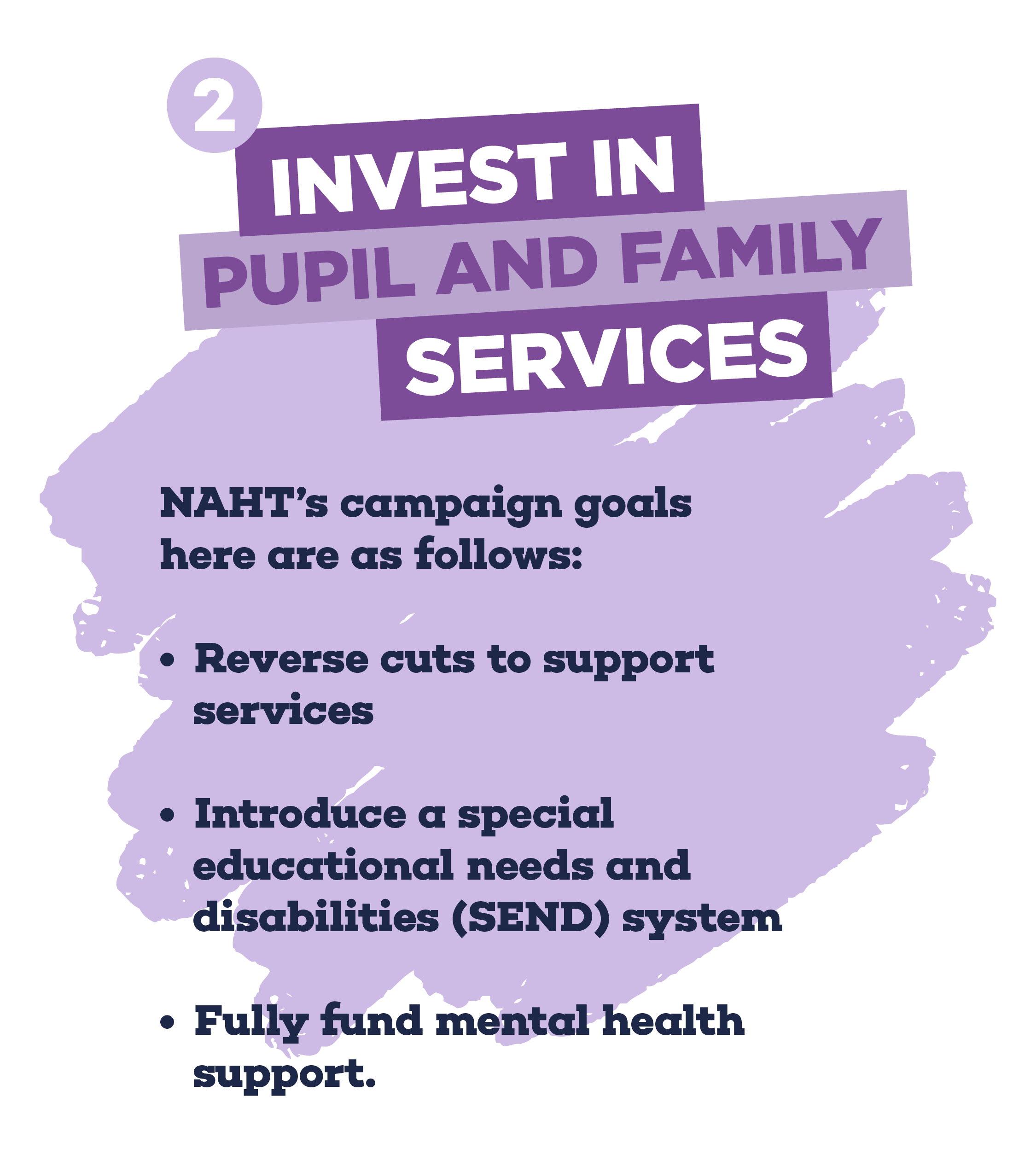
As already highlighted, you can’t talk about poverty and deprivation without also talking about the impact of hollowed-out communities and community services. Schools may play a pivotal community role, one that was amplified during the pandemic, but even they can’t catch and support everyone.

GRAHAM FROST
HEAD TEACHER AT ROBERT FERGUSON PRIMARY SCHOOL IN DENTON HOLME, CARLISLE
Graham encapsulates it neatly: “Schools have a core purpose of delivering education, but to do that, they depend on a range of services to meet the broader needs of children.
“For those children with needs that could be attended more efficiently by children’s services, the school is left trying to pick up the pieces. We need to be looking at the cost-effectiveness of early intervention.
“Because if we help earlier when an issue is smaller, it is less intensive in terms of resourcing. The government has to take this issue very, very seriously because families are in crisis and are facing extreme difficulties.”

School funding has been a long-term NAHT campaign and, again, has been thrust even more into the spotlight during the past two-and-a-half years of the pandemic. Now, as costs and prices rise across the board, squaring the funding circle and balancing the already under-pressure books are becoming much harder.

ALAN GARNETT
HEAD TEACHER AT NORTH PRIMARY SCHOOL IN COLCHESTER, ESSEX
“Every year, the school funding situation gets worse. We are expected to do more and more, and although the money is rising, we are still underfunded,” points out Alan.

JULIE KELLY
HEAD TEACHER AT WEST MEON CHURCH OF ENGLAND PRIMARY SCHOOL IN HAMPSHIRE
“Small schools have always been vulnerable, and a lot of small schools across the country have closed over time,” adds Julie.
“In the past, we were subsidised by the county. That is now stopping, and so our internet costs will be going from £2,500 to £6,000,” she points out. “Obviously, it’s an impact going into the budget that takes away from what we’re doing to support the children.”
It’s not just about schools being driven into deficit or being unable to balance the books, although that’s bad enough, points out Rob. It’s the indirect impact that funding cuts have on schools – the things they can no longer do and the added value and richness that are lost.
“We are in 2022, and we are the world’s fifth-richest economy. Yet many, many and more and more children don’t get to go on holiday or to the theatre, a museum or the seaside for a day,” Rob emphasises.
“Some of those school trips were the only opportunity children had to do and experience these things, but they’ve all gone, eradicated because of school funding cuts. Yet, against the gloom, there is a sense of optimism as an organisation. As a profession, we want to campaign for the benefit of all children, their families and the communities that we serve,” he adds.
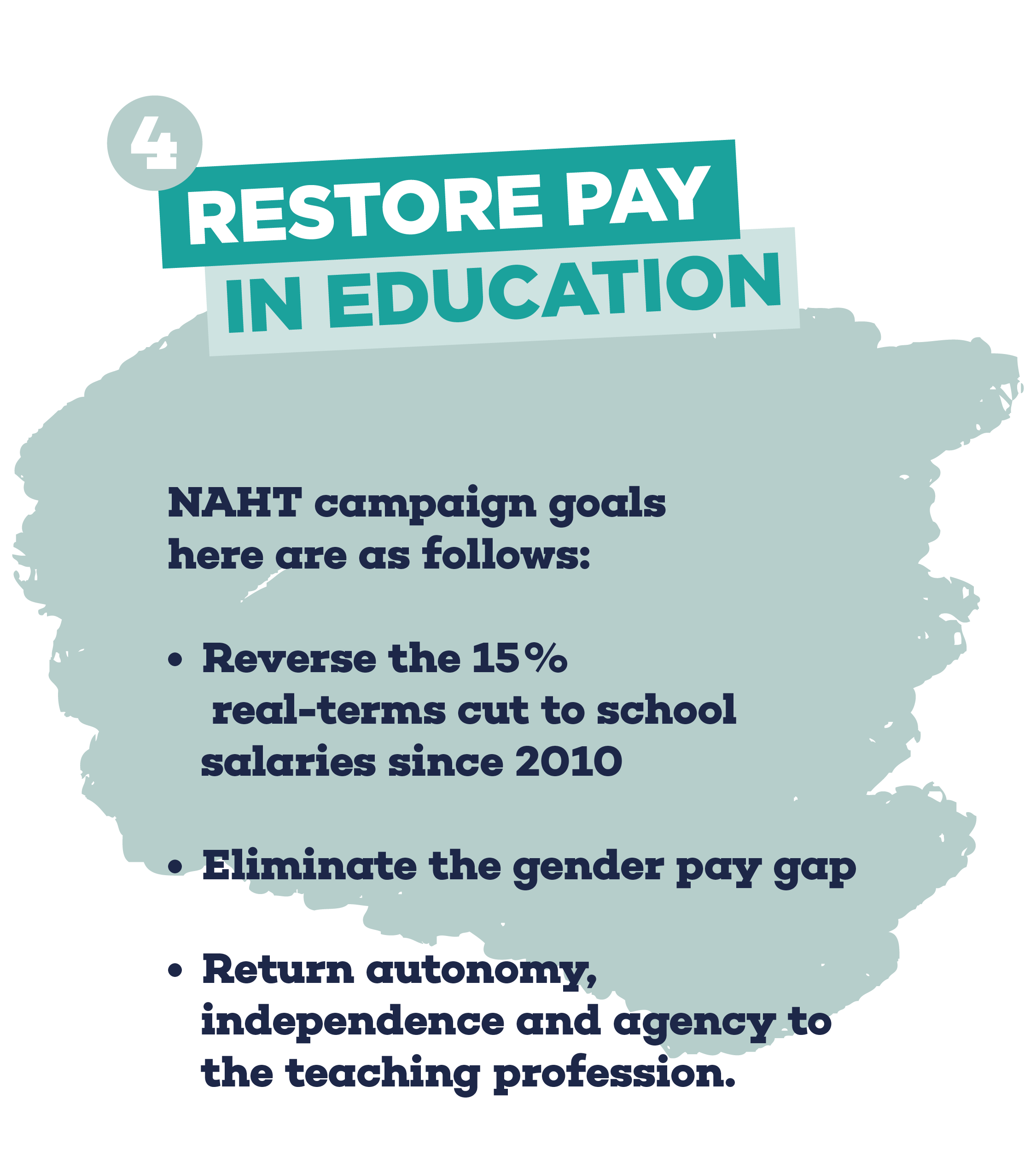
Pay is clearly a ‘bread-and-butter’ trade union campaign, and with inflation and the rising cost of living, it is unsurprising that it is set to be a key campaign battleground for NAHT this autumn.
Recent campaigns in the Isle of Man, Jersey and Guernsey have brought a degree of optimism, points out Rob. “These campaigns should, I feel, begin to give inspiration to members in England; to start to get them off their knees and fight for their pay,” he says.
In the Isle of Man, NAHT members took part in a new consultative ballot in May over a revised pay offer from the island’s Department of Education, Sport and Culture (DESC).
A previous offer made in January was rejected by a ballot of serving NAHT members in the Isle of Man by 55-45%. The revised offer has included amended pay scales backdated to September 2021, with lecturers’ pay to be aligned with teachers'.
A commitment has also been made to introduce up to 20 cover supervisors to work across all school phases, with a pledge to start this recruitment immediately. Additionally, a promise has been made that pay talks for 2022/23 will commence immediately.
In Jersey, NAHT members have successfully secured a 2.9% pay rise plus a £500 bonus ‘thank you’ for the commitment put in by the profession to tackling covid-19 over the past two years (see more on this here).
In Guernsey, meanwhile, NAHT has secured a three-year pay deal that delivers a 5% pay uplift with a consolidated bonus of £500 in year one. In year two, it will provide a pay award in line with inflation (forecast to be 6%), and in year three, it will be RPI -1%. “Overall, this will equate to a net increase of 2.7% above the inflation rate here,” says Rob.

TIM BOWEN
NAHT IMMEDIATE PAST PRESIDENT
Despite these successes, NAHT immediate past president Tim Bowen is under no illusions about the job still to do and the battles that will likely still need to be fought. “The pay of school leaders is one of the key reasons why so many deputy, assistant heads and middle leaders who have thought about going into management choose not to take that career path,” he says.
“There has to be a reward for the increased pressures and accountability that go with senior school leadership. We have to take every opportunity to get the message across to the government that there is a real crisis approaching around the future supply of school leaders,” he adds.

JACQUELINE HILL
HEAD TEACHER AT MAPPERLEY PLAINS PRIMARY SCHOOL IN NOTTINGHAM
“It is affecting the recruitment and retention of really good staff. The quality of staff we’re losing from the profession isn’t necessarily being replaced,” agrees Jacqueline.

LIAM MCGUCKIN
NAHT(NI) PRESIDENT
"The main thing at stake is the future development of our children – that they can reach their maximum potential, which isn’t easy when we don’t have staff working at capacity. We need to recruit more people, and we need to retain people in the next few years,” says Liam.
“NAHT is demanding a fair pay settlement towards restoring proper pay for our school leaders who deliver so much for our children and young people,” he adds.
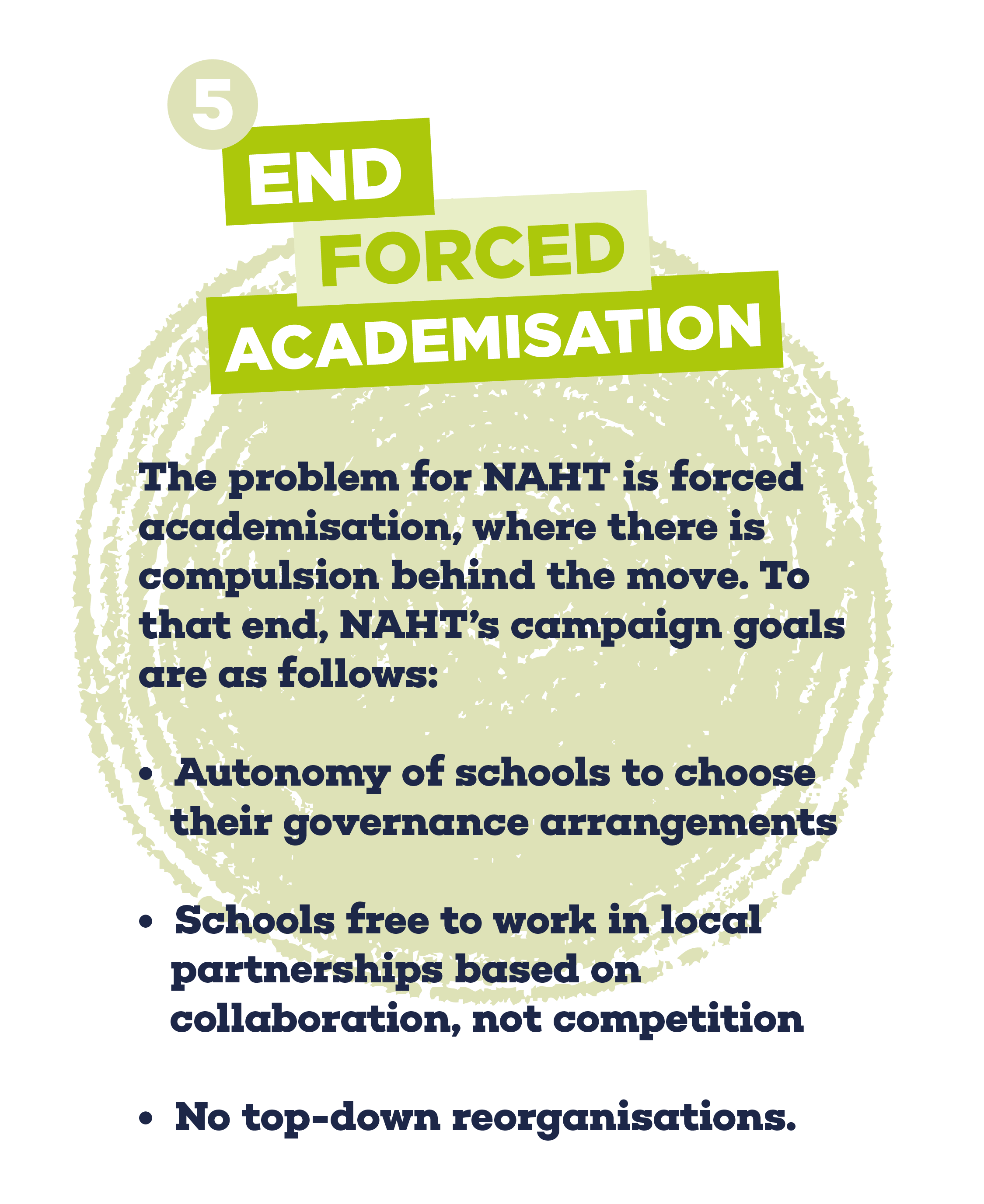
NAHT’s campaign here has an important nuance. As a union, NAHT recognises the realpolitik of academisation; as a business model and structure, it’s now a reality on the ground for many schools. In fact, it works well for them. Academisation per se is, therefore, not the issue.

DAME NICOLA STEPHENSON
CHIEF EXECUTIVE OF THE VALOUR MULTI-ACADEMY TRUST IN NEWCASTLE
That balance is reflected by Dame Nicola Stephenson. “As a CEO, I’m obviously for academisation in schools that really want to be an academy. We weren’t forced to become an academy; it was the right choice for my group of schools,” she says.
“I’m totally against the academisation of schools who wish not to take that path, and there are many, many other options,” she adds.
MP ROUNDTABLES
"It was really powerful to have the shadow secretary of state engaging directly".

DEBRA DE MUSCHAMP
NAHT NORTH-EAST REGIONAL SECRETARY AND CEO OF IRIS LEARNING TRUST IN SUNDERLAND
NAHT’s focus on ending child poverty is, especially now, a powerful ‘way in’ to engage with local and national politicians, points out Debra de Muschamp.
She, for example, recently organised a roundtable panel event with shadow education secretary Bridget Phillipson, who is also MP for Houghton and Sunderland South.
“It is about forming those relationships again after covid-19. It is about coming back together, seeing colleagues face to face and finding ways to get our campaigns out there,” she tells Leadership Focus.
“I organised the event with Bridget's team and invited her to our Sunderland branch. We used the five campaigns as the basis for our discussions. It helped to structure the event really nicely. Using the five priority campaigns is an excellent way to help steer the conversation.
“Bridget really engaged with every aspect of our ‘big five’ and spoke in-depth about many of them. Because the campaigns are wider, they don’t see education as an island, disconnected from broader societal issues. She talked passionately about child poverty, for example, and recognised the huge negative impact of this on children in the education system.
“It was really powerful to have the shadow secretary of state engaging directly with our five NAHT campaigns,” Debra adds.


MP ROUNDTABLES
"It was really powerful to have the shadow secretary of state engaging directly".

DEBRA DE MUSCHAMP
NAHT NORTH-EAST REGIONAL SECRETARY AND CEO OF IRIS LEARNING TRUST IN SUNDERLAND
NAHT’s focus on ending child poverty is, especially now, a powerful ‘way in’ to engage with local and national politicians, points out Debra de Muschamp.
She, for example, recently organised a roundtable panel event with shadow education secretary Bridget Phillipson, who is also MP for Houghton and Sunderland South.
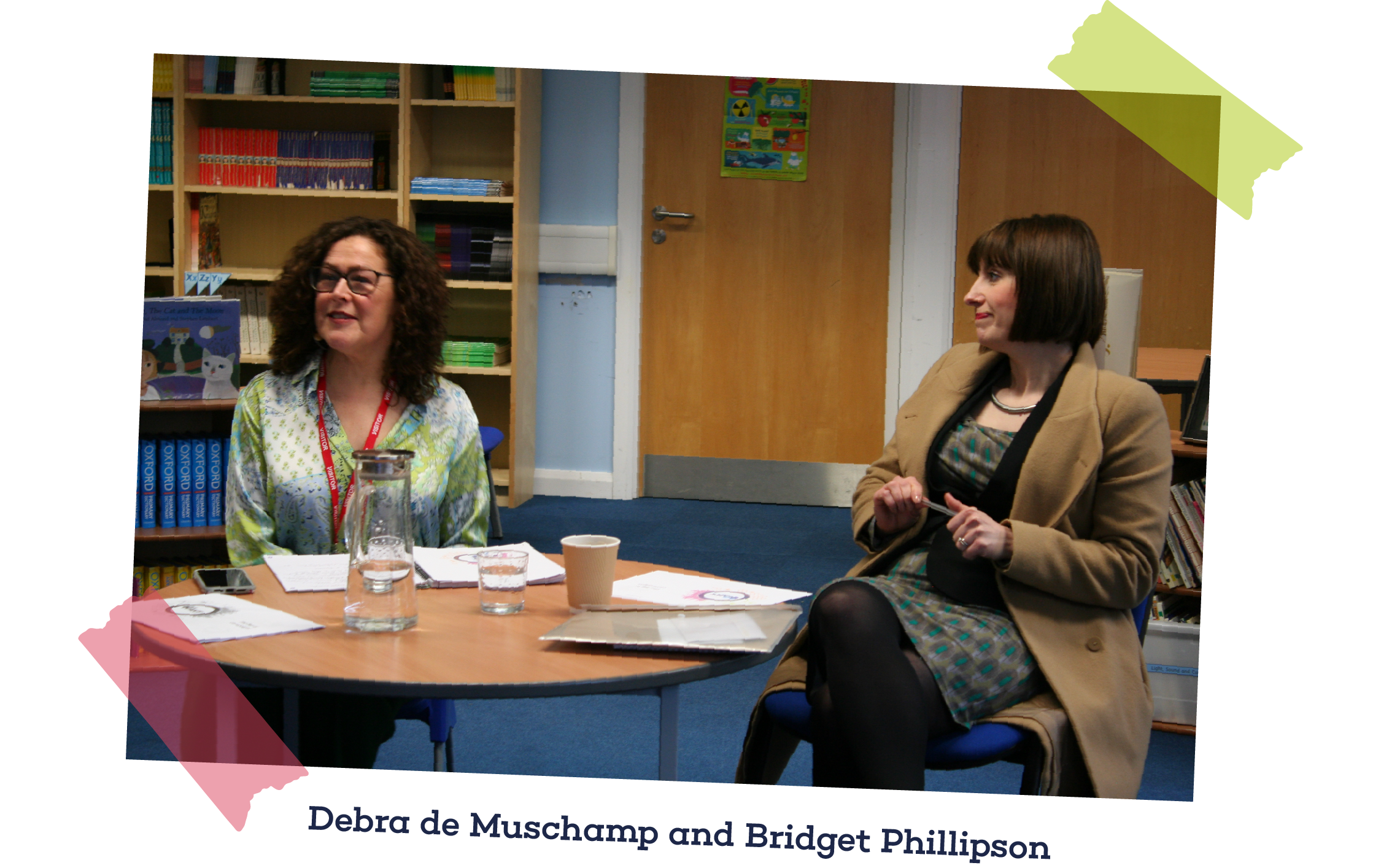
“It is about forming those relationships again after covid-19. It is about coming back together, seeing colleagues face to face and finding ways to get our campaigns out there,” she tells Leadership Focus.
“I organised the event with Bridget's team and invited her to our Sunderland branch. We used the five campaigns as the basis for our discussions. It helped to structure the event really nicely. Using the five priority campaigns is an excellent way to help steer the conversation.
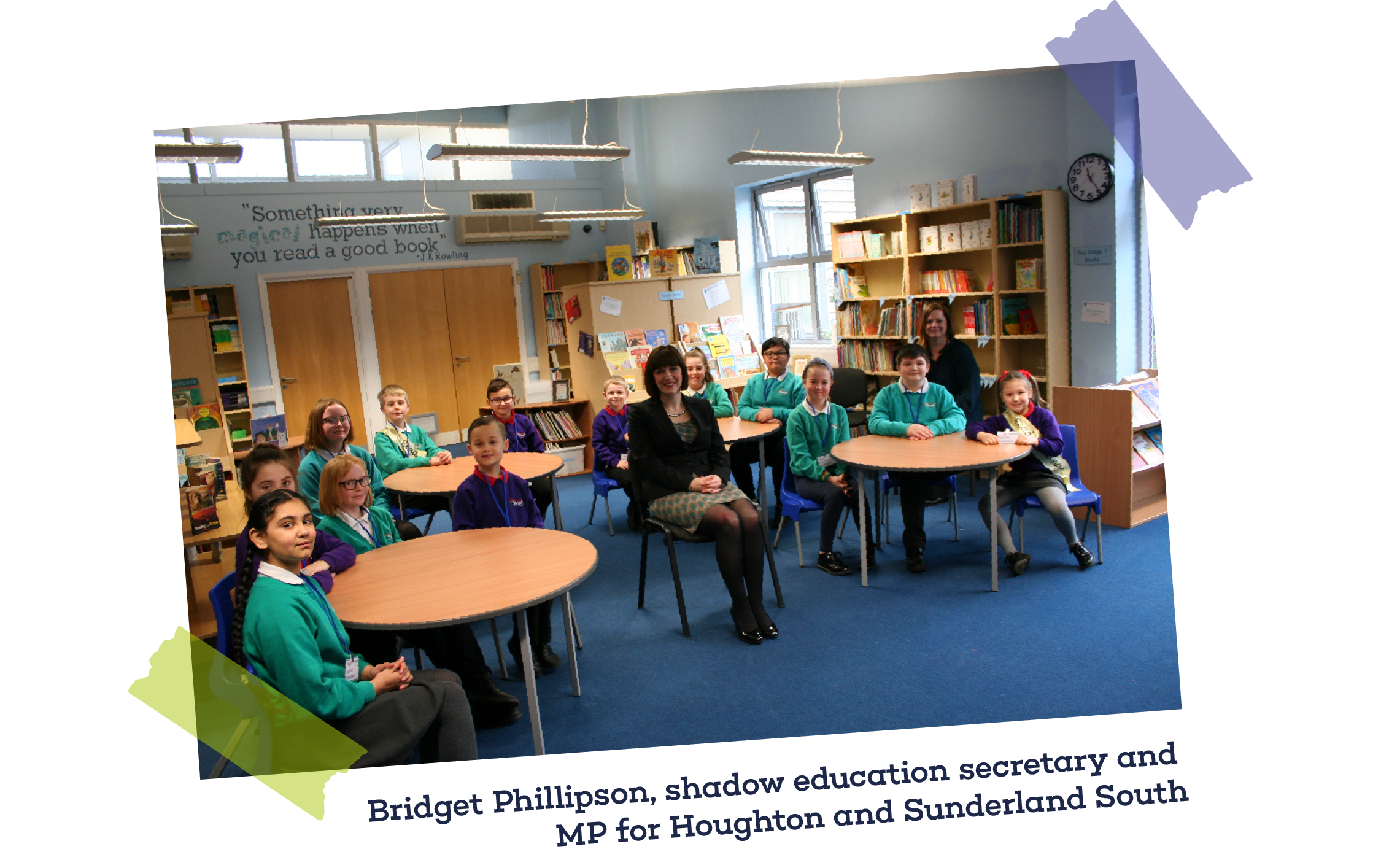
“Bridget really engaged with every aspect of our ‘big five’ and spoke in-depth about many of them. Because the campaigns are wider, they don’t see education as an island, disconnected from broader societal issues. She talked passionately about child poverty, for example, and recognised the huge negative impact of this on children in the education system.
“It was really powerful to have the shadow secretary of state engaging directly with our five NAHT campaigns,” Debra adds.
JERSEY’S PAY DEAL
“It is a once-in-a-generation opportunity for us to address inequity".

SAM COOPER
NAHT'S PRESIDENT IN JERSEY
Jersey’s pay deal is a “fair award” but needed the profession and unions to come together to secure it, argues NAHT's president in Jersey, Sam Cooper.
“The negotiations will start again soon for January 2023, but I think we’re now coming at it from a position of strength,” he tells Leadership Focus.
The union has also held education ‘hustings’ over the summer, working with the other education unions. "We are putting questions to the respective politicians about all-things education, including what they will be doing to compensate for the erosion of teachers’, head teachers’ and school leaders’ pay over the last 15 years,” says Sam.
“It is a once-in-a-generation opportunity for us to address inequity in the education service at many levels, whether that’s around teachers’ pay or the recruitment and retention of staff – the challenges that we are facing. There is an exodus of staff leaving the island at various levels because of living costs over here. For example, there is a real shortage of learning support assistants because living costs are so high.
“NAHT, I think, genuinely reflects the community’s concerns here. The things we’re trying to address through, for example, our hustings; we’re taking the lead in working to influence decision-makers.
“Too many teachers, and too many support staff, simply can’t afford to stay and live in Jersey. NAHT is reflecting that crisis in our conversations with politicians and looking at what key workers’ housing needs to look like on the island. These are important issues – the issues affecting the community beyond schools and school leaders,” Sam points out.



JERSEY’S PAY DEAL
“It is a once-in-a-generation opportunity for us to address inequity".

SAM COOPER
NAHT'S PRESIDENT IN JERSEY
Jersey’s pay deal is a “fair award” but needed the profession and unions to come together to secure it, argues NAHT's president in Jersey, Sam Cooper.
“The negotiations will start again soon for January 2023, but I think we’re now coming at it from a position of strength,” he tells Leadership Focus.
The union has also held education ‘hustings’ over the summer, working with the other education unions. "We are putting questions to the respective politicians about all-things education, including what they will be doing to compensate for the erosion of teachers’, head teachers’ and school leaders’ pay over the last 15 years,” says Sam.

“It is a once-in-a-generation opportunity for us to address inequity in the education service at many levels, whether that’s around teachers’ pay or the recruitment and retention of staff – the challenges that we are facing. There is an exodus of staff leaving the island at various levels because of living costs over here. For example, there is a real shortage of learning support assistants because living costs are so high.

“NAHT, I think, genuinely reflects the community’s concerns here. The things we’re trying to address through, for example, our hustings; we’re taking the lead in working to influence decision-makers.
“Too many teachers, and too many support staff, simply can’t afford to stay and live in Jersey. NAHT is reflecting that crisis in our conversations with politicians and looking at what key workers’ housing needs to look like on the island. These are important issues – the issues affecting the community beyond schools and school leaders,” Sam points out.
‘UNLAWFUL’ ACADEMY ORDERS
"If you are going to force someone to do something, it won’t work."
A recent ‘win’ on forced academisation for NAHT has been its success, with ASCL, NEU and UNISON, in compelling education secretary Nadhim Zahawi to withdraw academy orders sent to schools in the Catholic Diocese of Hallam, Sheffield, instructing a number of schools to join multi-academy trusts (MATs), after NAHT and the other unions warned they were ‘unlawful’.
The diocese, it was concluded, had misled its schools and the Department for Education (DfE) by applying for conversion orders on behalf of schools that had not resolved to make the change. The DfE then failed, in turn, in its duty and issued the orders without proper inquiry. The orders also covered some schools that had already converted to academy status and were being forced into another trust.
As Kathryn Fox, business manager at St Patrick’s Catholic Voluntary Academy, one of the affected schools, tells Leadership Focus: “I came from a background in higher education to St Patrick’s to take them through converting to an academy. In fact, for St Patrick’s, it has been the best decision ever made. I will happily give people chapter and verse on how brilliant academisation has been for us; how the school's finances have turned around since becoming a standalone academy.
“I was fully aware that the Sheffield head teachers had been talking about becoming part of a MAT for a long time. Again, I understood and sang the benefits of being in a MAT, but I also understood the disadvantages. When it came out that the diocese wanted all 47 schools to become MATs and within 12 months, it just came out of the blue.
“It was presented as being a done deal; that the bishop had given a ‘clarity of direction’, which, according to the head teachers, meant we had no choice and had to get on with it. The governors assumed it was a fait accompli. However, I always thought this wasn’t right. The process and the law weren’t being followed in the arrangements for moving to a MAT. As I felt like a lone voice, I sought advice from NAHT.
"With NAHT’s help, I was able to update our governing body, which then decided to step back and passed a resolution not to join the MAT at this present time. Right now, there are only 10 schools that I am aware of that have agreed to join out of 47.
“I remain one of the biggest supporters of academisation. It is the ‘forced’ bit that is a problem. If you are going to force someone to do something, it won’t work. It may be that they will join the MAT eventually, and of course, the government wants all schools by 2030 to be part of a successful MAT. But that is the key; we want to join a successful MAT, not just one because that’s what we’ve got to do.”


‘UNLAWFUL’ ACADEMY ORDERS
"If you are going to force someone to do something, it won’t work."

A recent ‘win’ on forced academisation for NAHT has been its success, with ASCL, NEU and UNISON, in compelling education secretary Nadhim Zahawi to withdraw academy orders sent to schools in the Catholic Diocese of Hallam, Sheffield, instructing a number of schools to join multi-academy trusts (MATs), after NAHT and the other unions warned they were ‘unlawful’.
The diocese, it was concluded, had misled its schools and the Department for Education (DfE) by applying for conversion orders on behalf of schools that had not resolved to make the change. The DfE then failed, in turn, in its duty and issued the orders without proper inquiry. The orders also covered some schools that had already converted to academy status and were being forced into another trust.
As Kathryn Fox, business manager at St Patrick’s Catholic Voluntary Academy, one of the affected schools, tells Leadership Focus: “I came from a background in higher education to St Patrick’s to take them through converting to an academy. In fact, for St Patrick’s, it has been the best decision ever made. I will happily give people chapter and verse on how brilliant academisation has been for us; how the school's finances have turned around since becoming a standalone academy.
“I was fully aware that the Sheffield head teachers had been talking about becoming part of a MAT for a long time. Again, I understood and sang the benefits of being in a MAT, but I also understood the disadvantages. When it came out that the diocese wanted all 47 schools to become MATs and within 12 months, it just came out of the blue.
“It was presented as being a done deal; that the bishop had given a ‘clarity of direction’, which, according to the head teachers, meant we had no choice and had to get on with it. The governors assumed it was a fait accompli. However, I always thought this wasn’t right. The process and the law weren’t being followed in the arrangements for moving to a MAT. As I felt like a lone voice, I sought advice from NAHT.
"With NAHT’s help, I was able to update our governing body, which then decided to step back and passed a resolution not to join the MAT at this present time. Right now, there are only 10 schools that I am aware of that have agreed to join out of 47.

“I remain one of the biggest supporters of academisation. It is the ‘forced’ bit that is a problem. If you are going to force someone to do something, it won’t work. It may be that they will join the MAT eventually, and of course, the government wants all schools by 2030 to be part of a successful MAT. But that is the key; we want to join a successful MAT, not just one because that’s what we’ve got to do.”
VIEW FROM THE NATIONS
Pay will be a big conversation point for Northern Ireland during the autumn, even if, unsurprisingly, much of the political bandwidth in the coming months is set to be taken up by the future of the Northern Ireland Assembly and Northern Ireland Protocol.

GRAHAM GAULT
NAHT(NI) INTERIM DIRECTOR
“Collectively, in April of last year, with the other unions in the Northern Ireland Teachers' Council, NAHT put in a pay claim of 6%,” explains Graham.
“We felt that was empathetic to the conditions at the time. In February this year, the employers came back with a deal that would see school leaders receive a pay increase of 2.49% over two years, but it was only applicable to those at the top of their individual school range (ISR). So, a quite significant number of our members would not have had any benefit for a number of years.
“Every September pretty much, our school leaders start the new school year with a pay cut. That has been the reality of their experience for over a decade now – in fact, for the past 12 years. They have experienced a decline in their pay of around 20% in real terms. No worker should be starting every year with a pay cut, particularly when expectation and need have increased and resourcing for people to do their job has decreased,” he adds.
As Leadership Focus went to press in June, NAHT members were due to be voting on an indicative ballot on taking industrial action short of a strike. “We won’t be on our own. NASUWT is already in industrial action short of a strike here, and the other trade unions were due to be conducting consultative ballots during June,” says Graham.
“The very strong possibility is that we will be negotiating on this over the summer. If no resolution is found, the industrial landscape in September and October will be very complicated indeed,” he adds.
School funding and child poverty will also be key campaign issues within Northern Ireland this autumn, Graham points out. “In terms of funding, the schools in Northern Ireland have been in a state of crisis for well over seven years now. In the last decade, hundreds of millions of pounds have been taken away from schools, and support services for schools have gone, such as educational psychology.
“You can’t take hundreds of millions of pounds away from the delivery of education without expecting very significant parts of the service to fall apart. At the same time, expectations, responsibilities and workload pressures have all increased. School funding is an absolutely essential aspect of what our politicians need to deliver and get back around the table on.
“The levels of poverty across Northern Ireland are shocking, and again, our school leaders and teachers are filling gaps that a properly functioning society shouldn’t have. It shouldn’t be the case that children arrive at school without food in their tummies, and it shouldn’t be the case that parents have to go without to ensure their children have food. It is 2022; it is just shocking that we are in this situation,” Graham adds.

LAURA DOEL
NAHT CYMRU DIRECTOR
In Wales, a key battleground is set to be the Welsh Government’s plans to reform and potentially extend the school day and year, highlights Laura.
“Already, the Welsh Government has started with some evidence gathering, so there has been a 10-week pilot scheme to extend the school day by an hour in 13 schools across Wales. That has just come to an end, and we are awaiting the evaluation results,” she tells Leadership Focus.
“When it comes to reforming the school year, ideas vary from an additional week off at Christmas and a four-week summer holiday rather than six to an extra week at half-term and standardising the length of terms. There is talk of having three standardised terms, so each term has the same number of weeks. There is talk of fixing when the spring break is, so what would traditionally be the Easter holidays would be fixed for two weeks wherever Easter falls.
“NAHT’s position on any reform of the school day or year is that we need the evidence base to show this is a good idea for learners. Education is a focus on teaching and learning; there are specific skills that need to be deployed to be able to do that successfully, and childcare is not the role of teachers and leaders. If the Welsh Government wants to provide a national childcare service that will benefit working families, that’s something we could support. But it is not necessarily something we feel schools should deliver,” Laura adds.
Another key campaigning area is the ongoing rollout of a new national curriculum for Wales.
“In September, we will be starting the implementation of the new national curriculum. Initially, primary and secondary schools were supposed to transition in September this year. But before Christmas, the Welsh Government announced there was going to be an option for secondary schools to roll out the new curriculum in either September 2022 for year seven or wait until 2023 and roll it out to years seven and eight at the same time,” Laura explains.
As a result, more than half of secondary schools in Wales have opted to wait. “But, of course, the same flexibility has not been afforded to primary schools at all. We’ve renewed our calls to the Welsh Government to afford primary schools some element of flexibility. Not necessarily a delay to the rollout, but a delay or pause on accountability measures that will, undoubtedly, be brought in as soon as the new curriculum comes in.
“This is still a really challenging time. Covid-19 is still here. Covid-19 has not gone away in primary schools; we’re still trying to grapple with high levels of staff members and school leaders’ absence. There is a huge drive by the Welsh Government, understandably so, to get as many learners as possible back into school. But schools will need some help to do this; they can’t then start taking on additional responsibility, and one that we feel is clearly the role of other support services,” Laura adds.
School funding and pay will continue to be huge challenges and potential flashpoints. “Schools are still suffering from staff members’ absence because of covid-19. Yet, in March, the Welsh Government’s fund to support schools with additional costs as a result of the pandemic came to an end. Those ongoing costs continue to cripple schools’ budgets. Schools are really struggling,” says Laura.
“On pay, we are waiting for the independent Welsh Pay Review Body’s report, which is due out anytime. We hope it has listened to the concerns of NAHT and other colleagues in the trade union movement. We are deeply concerned that even though ALNCo [additional learning needs coordinator] roles have been in place for two years, there is still no specific provision to remunerate them within the current pay and conditions document. That is something we’re continuing to lobby hard for.
“In addition, the current pay and conditions document doesn’t recognise a host of leadership positions that are now in place in schools – executive headship, federations, heads of school and so on.
“Our focus for the autumn term will, therefore, be to ensure our members get the remuneration they deserve, whatever position they are within the school, and that school funding remains a top priority for local authorities and the Welsh Government, given the huge financial pressures schools still face as a result of the pandemic,” Laura adds.




VIEW FROM THE NATIONS
Pay will be a big conversation point for Northern Ireland during the autumn, even if, unsurprisingly, much of the political bandwidth in the coming months is set to be taken up by the future of the Northern Ireland Assembly and Northern Ireland Protocol.

GRAHAM GAULT
NAHT(NI) INTERIM DIRECTOR
“Collectively, in April of last year, with the other unions in the Northern Ireland Teachers' Council, NAHT put in a pay claim of 6%,” explains Graham.
“We felt that was empathetic to the conditions at the time. In February this year, the employers came back with a deal that would see school leaders receive a pay increase of 2.49% over two years, but it was only applicable to those at the top of their individual school range (ISR). So, a quite significant number of our members would not have had any benefit for a number of years.

“Every September pretty much, our school leaders start the new school year with a pay cut. That has been the reality of their experience for over a decade now – in fact, for the past 12 years. They have experienced a decline in their pay of around 20% in real terms. No worker should be starting every year with a pay cut, particularly when expectation and need have increased and resourcing for people to do their job has decreased,” he adds.
As Leadership Focus went to press in June, NAHT members were due to be voting on an indicative ballot on taking industrial action short of a strike. “We won’t be on our own. NASUWT is already in industrial action short of a strike here, and the other trade unions were due to be conducting consultative ballots during June,” says Graham.
“The very strong possibility is that we will be negotiating on this over the summer. If no resolution is found, the industrial landscape in September and October will be very complicated indeed,” he adds.
School funding and child poverty will also be key campaign issues within Northern Ireland this autumn, Graham points out. “In terms of funding, the schools in Northern Ireland have been in a state of crisis for well over seven years now. In the last decade, hundreds of millions of pounds have been taken away from schools, and support services for schools have gone, such as educational psychology.
“You can’t take hundreds of millions of pounds away from the delivery of education without expecting very significant parts of the service to fall apart. At the same time, expectations, responsibilities and workload pressures have all increased. School funding is an absolutely essential aspect of what our politicians need to deliver and get back around the table on.
“The levels of poverty across Northern Ireland are shocking, and again, our school leaders and teachers are filling gaps that a properly functioning society shouldn’t have. It shouldn’t be the case that children arrive at school without food in their tummies, and it shouldn’t be the case that parents have to go without to ensure their children have food. It is 2022; it is just shocking that we are in this situation,” Graham adds.

LAURA DOEL
NAHT CYMRU DIRECTOR
In Wales, a key battleground is set to be the Welsh Government’s plans to reform and potentially extend the school day and year, highlights Laura.
“Already, the Welsh Government has started with some evidence gathering, so there has been a 10-week pilot scheme to extend the school day by an hour in 13 schools across Wales. That has just come to an end, and we are awaiting the evaluation results,” she tells Leadership Focus.

“When it comes to reforming the school year, ideas vary from an additional week off at Christmas and a four-week summer holiday rather than six to an extra week at half-term and standardising the length of terms. There is talk of having three standardised terms, so each term has the same number of weeks. There is talk of fixing when the spring break is, so what would traditionally be the Easter holidays would be fixed for two weeks wherever Easter falls.
“NAHT’s position on any reform of the school day or year is that we need the evidence base to show this is a good idea for learners. Education is a focus on teaching and learning; there are specific skills that need to be deployed to be able to do that successfully, and childcare is not the role of teachers and leaders. If the Welsh Government wants to provide a national childcare service that will benefit working families, that’s something we could support. But it is not necessarily something we feel schools should deliver,” Laura adds.
Another key campaigning area is the ongoing rollout of a new national curriculum for Wales.
“In September, we will be starting the implementation of the new national curriculum. Initially, primary and secondary schools were supposed to transition in September this year. But before Christmas, the Welsh Government announced there was going to be an option for secondary schools to roll out the new curriculum in either September 2022 for year seven or wait until 2023 and roll it out to years seven and eight at the same time,” Laura explains.
As a result, more than half of secondary schools in Wales have opted to wait. “But, of course, the same flexibility has not been afforded to primary schools at all. We’ve renewed our calls to the Welsh Government to afford primary schools some element of flexibility. Not necessarily a delay to the rollout, but a delay or pause on accountability measures that will, undoubtedly, be brought in as soon as the new curriculum comes in.
“This is still a really challenging time. Covid-19 is still here. Covid-19 has not gone away in primary schools; we’re still trying to grapple with high levels of staff members and school leaders’ absence. There is a huge drive by the Welsh Government, understandably so, to get as many learners as possible back into school. But schools will need some help to do this; they can’t then start taking on additional responsibility, and one that we feel is clearly the role of other support services,” Laura adds.
School funding and pay will continue to be huge challenges and potential flashpoints. “Schools are still suffering from staff members’ absence because of covid-19. Yet, in March, the Welsh Government’s fund to support schools with additional costs as a result of the pandemic came to an end. Those ongoing costs continue to cripple schools’ budgets. Schools are really struggling,” says Laura.

“On pay, we are waiting for the independent Welsh Pay Review Body’s report, which is due out anytime. We hope it has listened to the concerns of NAHT and other colleagues in the trade union movement. We are deeply concerned that even though ALNCo [additional learning needs coordinator] roles have been in place for two years, there is still no specific provision to remunerate them within the current pay and conditions document. That is something we’re continuing to lobby hard for.
“In addition, the current pay and conditions document doesn’t recognise a host of leadership positions that are now in place in schools – executive headship, federations, heads of school and so on.
“Our focus for the autumn term will, therefore, be to ensure our members get the remuneration they deserve, whatever position they are within the school, and that school funding remains a top priority for local authorities and the Welsh Government, given the huge financial pressures schools still face as a result of the pandemic,” Laura adds.


